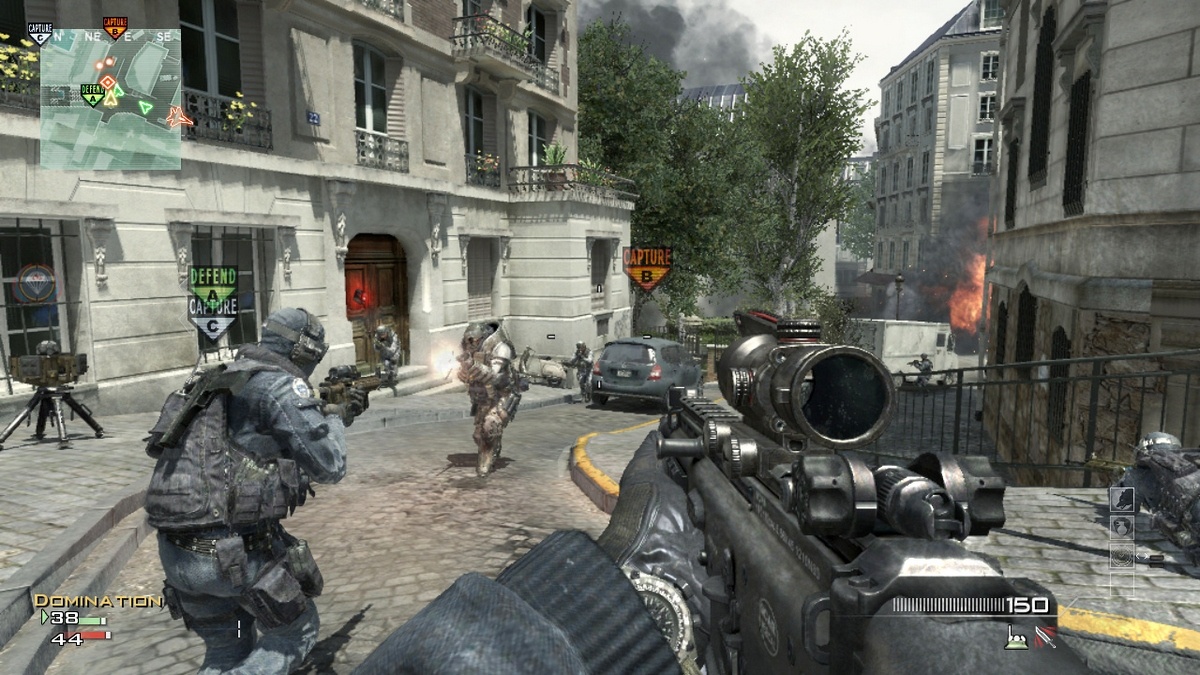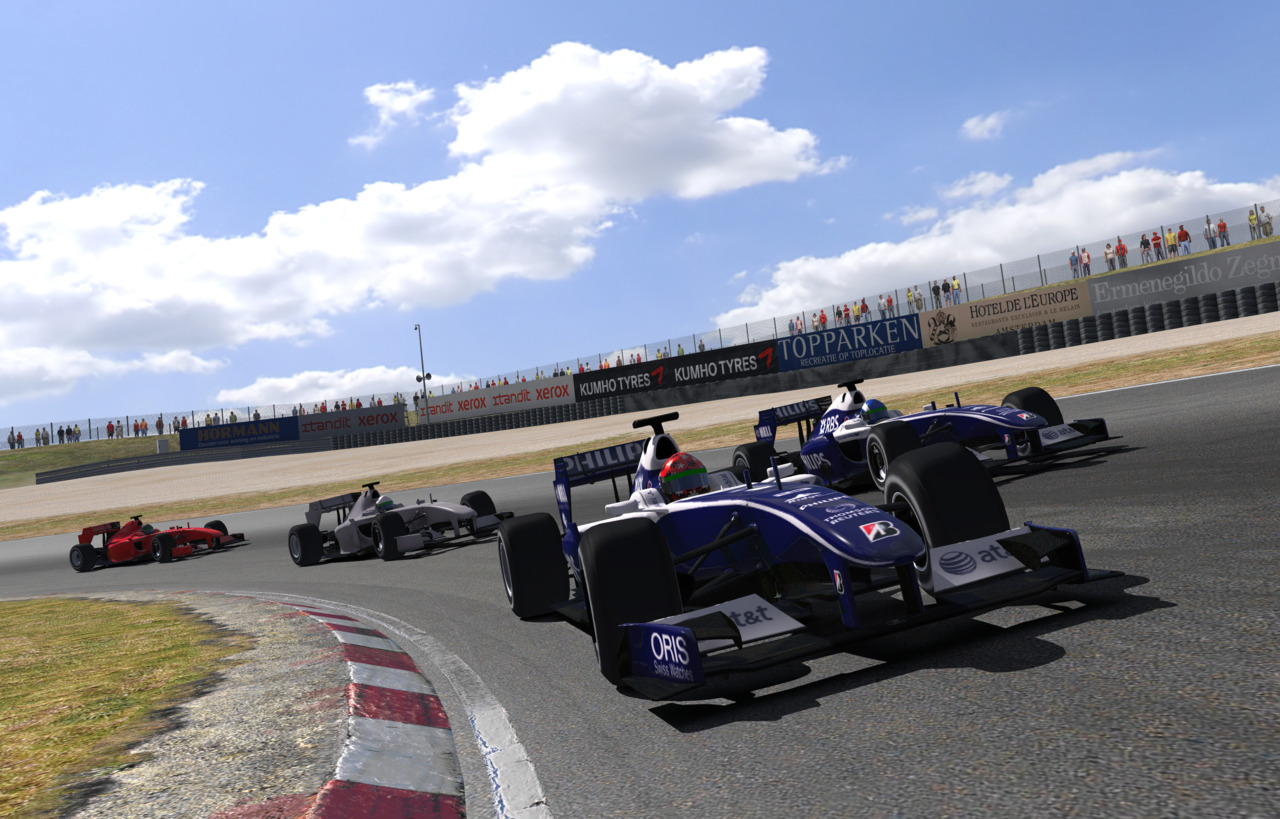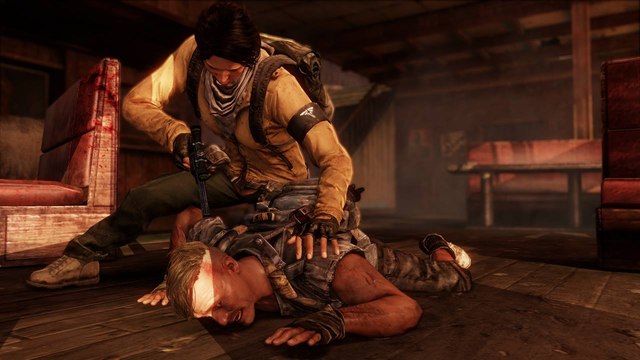Something to Lose: The Pitfalls and Potential of Competitive Multiplayer
Chris Watters examines how some games are spoiling online competition and what others are doing to save it.
The video game industry runs on competition. Every day, millions of consumers flock to virtual sporting arenas, fight clubs, racetracks, and battlefields to face off against other players in a broad variety of contests. And it's no wonder; the emotional highs and lows of competition translate beautifully to the digital realm. The thrill of victory, the agony of defeat, the fellowship of teamwork, the pride of improving your skills, and the simple pleasure of play can all be found in competitive video games.
In fact, given their ability to manipulate rules, systems, and mechanics far beyond what is possible in the real world, games have the power to intensify competition in unique ways. Experience and reward systems like the one pioneered by Call of Duty 4: Modern Warfare are prevalent, systems in which victorious players earn a deluge of cosmetic and concrete rewards. These prizes can certainly make winning more gratifying, but they can also have a subversive effect that erodes the very basis of competition.
The problem is that such prizes aren't reserved for the winners. Losing players also earn rewards, just at a slower rate than their victorious opponents. In such systems, even the losers haven't really lost. Getting a consolation prize is all well and good, but by softening the impact of defeat, games like Call of Duty diminish the emotional range of competition. The sweetness of victory is diluted by the knowledge that you also would've made out alright if you had lost. The energizing fire kindled by the frustration of loss is doused, replaced by carrot-on-a-stick motivation to just keep cranking through matches and earning rewards. When the stakes are trivialized, the competitive spirit becomes a pale shade of what it could be.
Fortunately, there are games that recognize the value of losing and do some clever things to preserve its power. One of the most basic ways that games encourage players to care about losing is rank. Not a Battlefield 3 or Killzone 3-style rank that can never decrease regardless of how poorly the player does, but a Halo 2 or Street Fighter IV-style rank that rises and falls depending on performance. Ranks like these play a critical role in many matchmaking systems as they aim to pair Starcraft II players of comparable skill, or minimize the likelihood of one-sided matches in League of Legends.
But therein lies the limitation of rank; it is entirely dependent on how much the player cares about their standing.Competitors in these games often care deeply about their rank, surging with pride when they move up and churning with frustration when they get bumped down. Rank becomes an indicator of status and skill, and for players who hold their current number or league standing dear, it can be a strong motivator to avoid loss. But therein lies the limitation of rank; it is entirely dependent on how much the player cares about their standing. There are no in-game consequences for holding a lower or higher rank. The player is placed in a different tier of competitors, but they still experience the same game content. These kind of rank systems rely on players to motivate themselves, but other games take a more active role in stoking the competitive fires.
While rank systems exist outside of the gameplay proper, some games use in-game consequences to punish losing. In the classic hotbed of competition, Counter-Strike, players can improve their loadouts using money they earn during the match. Lose the match, however, and your loadout is reset to the default, leaving you at a disadvantage. Gun Monkeys uses a similar monetary system to govern your overall progress. You use money to buy guns for your loadout, but high-level weapons are expensive. In order to unlock them, you must stockpile winnings from successful matches, but one loss can bankrupt you and leave prime equipment well out of reach. In America's Army, players who violate the rules of engagement by injuring teammates or civilians risk stalling or reversing their progress through the leveling system, and can be automatically kicked from the game for serious violations. This system is particularly interesting because negative reinforcement isn't simply used to discourage losing; it's used to encourage players to play the game a certain way.
The driving simulator iRacing takes this kind of encouragement seriously. In order to access more than just a handful of rookie-friendly events, you need to earn a higher license. Interestingly, though there is a skill rank similar to the ranks discussed above, it is your safety rating that directly affects your license progress. This safety rating measures your performance independently of race results. Every time you collide with another racer, hit the wall, stray off track, or commit graver safety infractions, your rating is diminished.
In iRacing, as in America's Army, this negative reinforcement does more than just discourage poor performance. Maintaining a high safety rating is required for higher level licenses that give you access to a broader range of official events. Players who race recklessly are limited to a small number of events, while those who respect the rules of the track are given greater opportunities. This cultivates an online community that is dedicated to a certain standard of competition. Without yahoos careening around the track, competitors can focus on the finer challenges of racing, enjoying a heightened sense of realism and more intense competition.
…negative reinforcement isn't simply used to discourage losing; it's used to encourage players to play the game a certain way.In these two examples, having something to lose strengthens the core mechanics of the game and brings players together in the same competitive spirit. But in The Last of Us, the threat of loss exists outside of the core mechanics of the game. In the team-based competitive multiplayer mode, you must kill the other team by outmaneuvering, out-crafting, out-shooting, and out-bludgeoning them. Your performance in each round moves you along a linear unlock path that grants you new weapons and survival skills for your custom loadout. Taken at this level, it isn't much different from the everyone's-a-winner competitive systems described earlier.
There is, however, another element in play. When you enter the competitive mode, you are cast as the leader of a camp of survivors who exist nowhere else but in a small virtual petri dish on the multiplayer menu screen. The game challenges you to keep your group alive for twelve weeks until they can be evacuated to a safer place. Each match represents a day and, crucially, an opportunity to gather the supplies that your camp needs. If you have a good match, you can feed your survivors and even add population to your camp. Do poorly, however, and your survivors will become hungry, sick, and even die. Lose all your survivors and you must start the twelve-week challenge all over again.
This challenge exists separately from the aforementioned unlock progression. You can earn one-use boosters by growing your camp and completing timed mini-challenges, but these small bonuses have little impact on the core combat. The whole system is an ancillary part of the multiplayer mode, and you can enjoy the intense competitive action immensely without caring whether your survivors live or die.
But odds are, you will care. You will become attached to your survivors, especially if you've taken advantage of the clever Facebook connection option that populates your camp with names and faces from your friend list. You'll delight in seeing short messages that tell you your coworker is skinning a raccoon or your old roommate is repairing the north wall. When you see that your cousin is feeling desperately hungry, you'll flinch a little bit in spite of the fact that you know it's a fabrication. Even if you don't import names you know, you'll still take risks to grab supplies on the battlefield to avoid losing survivors. You'll feel creeping dread as the match wears on and you know you haven't been doing well. And at the end of a timed challenge when you don't have enough medicine to save everyone, you'll feel remorse when you have to choose which two survivors to save and which one to let die.
And those feelings, however fleeting or frivolous they may seem, are what makes this system so compelling. The Last of Us doesn't wound your pride with status loss or hurt your chances with material loss, it stings you with emotional loss. By creating a system removed from the core mechanics, The Last of Us' multiplayer mode transcends the idea of competition for competition's sake and gives the player something greater to fight for.
Not only does this resonate strongly with the principal themes of the campaign and make The Last of Us a more cohesive whole, it demonstrates the remarkable power of games to do more with competition than simply provide an exciting way for people to play. Some games soften the competitive stakes while others cultivate strong competitive communities, but ultimately these are replications of what competition is like in the real world. Imaginative systems like the one in The Last of Us show that competition can be enriched by context, that play can be elevated by emotion, and that video games are uniquely positioned to deliver such engaging experiences. Let's just hope the competition takes notice.
'Got a news tip or want to contact us directly? Email news@gamespot.com



Join the conversation